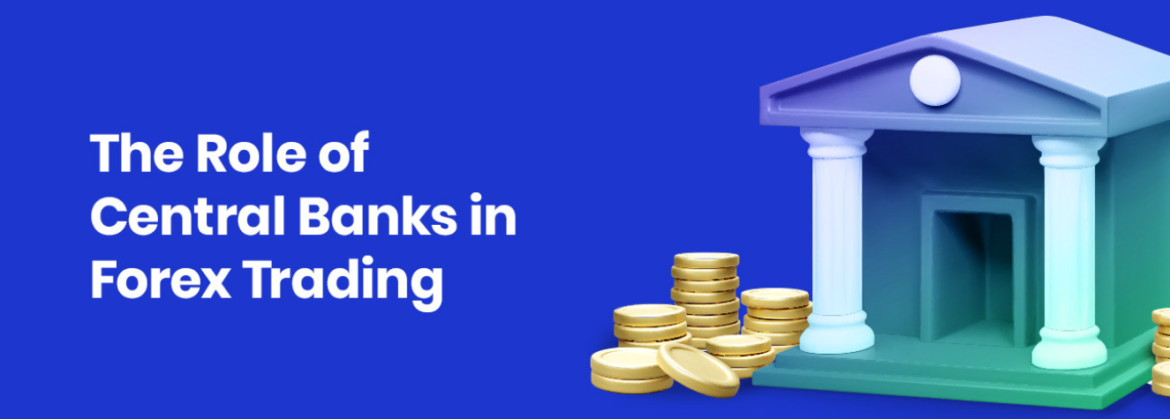The Role of Central Banks in Forex
When it comes to the foreign exchange (Forex) market, many people focus on traders, brokers, and economic indicators. But there’s another powerful player influencing currency values on a massive scale central banks.
These institutions are not just behind the scenes they’re key drivers of currency stability, volatility, and direction. In this post, we’ll explore what central banks are, what they do, and how their actions affect Forex trading.
What Is a Central Bank?
A central bank is a government-backed financial institution responsible for managing a country’s currency, money supply, and interest rates.
Examples of major central banks:
-
U.S. Federal Reserve (Fed)
-
European Central Bank (ECB)
-
Bank of England (BoE)
-
Bank of Japan (BoJ)
-
Swiss National Bank (SNB)
-
Reserve Bank of Australia (RBA)
🎯 Core Functions of Central Banks in Forex
Here are the main ways central banks influence the Forex market:
1. Monetary Policy & Interest Rates
Central banks set interest rates, which have a direct impact on the value of a currency.
-
Higher interest rates usually attract foreign investment and strengthen the currency.
-
Lower interest rates can encourage spending and borrowing but often weaken the currency.
Forex impact:
Traders closely watch rate decisions, as they can trigger large price movements in currency pairs. Even expectations or hints of a rate change can cause volatility.
2. Inflation Control
Central banks aim to keep inflation in check (often targeting around 2%). If inflation rises too quickly, they may raise interest rates to cool the economy. If inflation is too low, they might lower rates or inject money into the economy.
Forex impact:
Inflation data and central bank responses are closely linked. If a central bank appears aggressive in fighting inflation (hawkish), its currency typically gains value.
3. Currency Intervention
Sometimes, central banks intervene directly in the Forex market to influence their currency’s value—especially when it’s too strong or weak for their economy.
-
Example: The Swiss National Bank has historically intervened to prevent the Swiss Franc from appreciating too much.
-
Methods: Buying or selling their own currency, or using public statements to influence trader sentiment.
Forex impact:
Interventions can cause sharp and sudden moves in currency pairs. Traders often monitor central bank language for any sign of potential action.
4. Quantitative Easing (QE)
QE is when a central bank injects money into the economy by purchasing assets like government bonds. This increases the money supply and typically lowers interest rates.
Forex impact:
QE can weaken a currency, since it increases supply and lowers returns for investors. For example, the Fed’s QE programs in the 2010s caused extended dollar weakness.
5. Forward Guidance & Statements
Central banks regularly release economic forecasts, meeting minutes, and public speeches to communicate future policy directions.
Forex impact:
Markets often react instantly to central bank speeches, press conferences, and meeting notes. Language like “data-dependent,” “inflationary pressures,” or “policy tightening” can trigger big moves in currency pairs.
📈 How Traders Use Central Bank Info
Smart Forex traders always keep an eye on:
-
Central bank meeting calendars
-
Interest rate decisions and policy statements
-
Key economic indicators like CPI, unemployment, and GDP
-
Speeches from central bank governors (e.g., Jerome Powell, Christine Lagarde)
Trading tip:
During central bank announcements, liquidity can shrink, volatility can spike, and slippage can occur. It’s often best to avoid entering new trades during these high-risk periods unless you’re very experienced.
🧠 Case Study: Federal Reserve & the U.S. Dollar
When the Fed raises interest rates, it often strengthens the USD.
-
In 2022–2023, the Fed raised rates aggressively to fight inflation.
-
Result? The USD surged against many currencies like the EUR, JPY, and GBP.
This shows just how closely central bank policy is tied to Forex price movement.
✅ Final Thoughts
Central banks are not just background players—they’re central forces in shaping the global Forex landscape. Their decisions influence everything from interest rates to inflation, liquidity, and investor confidence.
As a trader, understanding central banks helps you:
-
Anticipate potential market moves
-
Manage risk around key news events
-
Align your trades with macroeconomic trends
Stay informed, watch the economic calendar, and never underestimate the power of a central bank press release!


